Ashura Opera was composed by Behzad Abdi, the Iranian composer, in 2008 based on librettos compiled by Behrouz Gharib. The main source for the libretto is poems by Mohtasham Kashani, a sixteenth century Iranian poet.
Tag Archives: Ramin Bahiraie
“Pledge of Love”
The “Pledge of Love” is the first album in a series composed based on the tasnifs by the renowned Iranian tasnif-maker Mohammad Ali Amir Jahed and recorded by Sahba Kohan Ensemble with Ramin Bahiraie as signer.
Latest posts
- Transition to Enlightenment: Six Lectures on Mozart’s String Quartets (5)
- Nasser Masoudi: The Voice of Gilan and a Legacy of Iranian Music
- Farhad Poupel: The Voice of the Shahnameh in the Orchestras Around the World
- Five Major Myths About Mozart’s Life
- Bahma Rajabi Passed Away!
- Reza Vohdani; Unveiling unpublished works, preservation of Iranian classical music
- Ahmad Pejman Passed Away!
- Timeless or Timely: The Role of Historical Context in Defining Artistic Value
- Leading the Charge in Censorship
- The Legacy of Khosrow Jafarzadeh
- Transition to Enlightenment: Six Lectures on Mozart’s String Quartets (4)
- Fereydoun Shahbazian, An Iranian Musical Icon Passed Away
From Past Days…

Principles of Playing Violin (IV)
Pattern No.3/1 Left hand finger Placement: 3/1/1: Landing Fingers on one String: In preliminary stages of training, an apprentice should pay attention to the principle of keeping fingers while placing them on the fingerboard. Professional violinists pay less attention to this principle. Novice player’s complying with this principle, in preliminary stages of training, has several…
Read More

The Structure of Kurdistan Daf (VI)
Researcher: Mohammad Tarighat Translator: Fatemeh Alimohammadi Hooks and attached rings: The junction of the ring to the arch is about 3 centimeters from the skin. The ring with its side rings should be as far as the diameter of a ring (about one and a half to one and eight centimeters) to make a proper…
Read More

Principles of Violin Playing (X)
Creating sound continuity between two notes in the source and destination positions when left hand position changes and “two different finger numbers” are involved is called portamento. Portamento can be performed on single string or two neighboring strings and with hand moving on fingerboard either upward or downward.
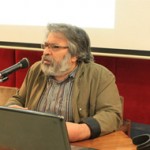
A year without Mohsen Ghanebasiri
The year 1396 (21 March 2017-20 March 2018) was the most sorrowful year for HarmonyTalk journal. One month after holding HarmonyTalk’s 13th establishment anniversary in Mohsen Ghanebasiri’s house in Tehran in April 2017, he untimely passed away. Mohsen Ghanebasiri was the prominent HarmonyTalk author.
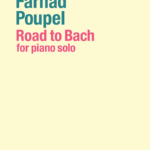
A few steps on the “Road to Bach”
The world of music has unparalleled respect for Bach. Bach is considered the spiritual father of classical music; Bach’s great position is due not only to his great achievements in the fields of harmony, counterpoint, and compositional sciences but also to his respect for and adherence to the artistic principles of classical music. In the history of classical music, it is recorded that Bach walked about fifty kilometers to listen to the music played by the great German organist Dieterich Buxtehude, and this is the path that every idealistic classical music student should walk.
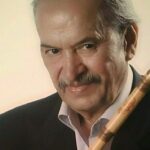
Maestro Hassan Nahid’s Role in Promoting the Ney
Maestro Hassan Nahid is one of the most prominent and distinctive artists who values high morals, discipline and hard work. His music activities include playing the Ney as both soloist and an accompaniment in the most important Iranian music orchestras and ensembles during the last fifty years, including the Orchestra of Iranian Instruments (Nusratullah Golpayegani), the Orchestra of National Instrumentalists of the Ministry of Culture and Arts (Payvar Orchestra), the Orchestra of Iranian Instruments (Morteza Hananeh) , Darvish Orchestra, Samaie Orchestra, Roudaki Orchestra, Maestros’ Ensemble, Aref Ensemble, as well as performances in various radio programs, many concerts in different countries, as well as a long teaching experience in the National Conservatory of Music, music universities and other music institutions to name but a few.
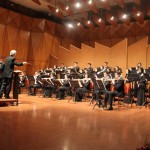
Tehran Flute Choir Established
Tehran Flute Choir was established in 1394 (late 2015) by Firouzeh Navai. Tehran Flute Choir, Iran’s first largest flute choir, recruited its members mostly from young talented flutists of Iranian Flute Association. Featuring piccolo, flute, alto flute and bass flute, Tehran Flute Choir, directed by Firouzeh Navai, premiered under the batons of Saeed Taghadosi on January 7-8, 2016 at Roudaki Hall in Tehran.
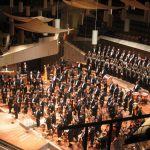
Iranian Fallacies – Global Performance
One of the most important criteria for measuring the quality of a piece of classical music is number of times the piece has been performance by different ensembles and orchestras in different eras. This belief has become so pervasive in some societies, such as Iranian society, that it is considered the only criterion for measuring the quality of a piece of classical music.
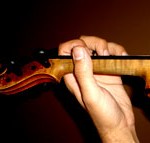
Principles of Violin Playing (III)
Violin players should always pay attention to the proper position of the left thumb and other points related to it and to its joining point to the palm.

“Symphonic Poems from Persia” Released in Germany
While the name “Persia” (Western historical name of Iran) has attracted tens of thousands of people from around the world to London’s British Museum to visit ancient Persian artifacts, the Nuremberg-based music company, Colosseum, invites Europeans to listen to eight masterpieces of Persian symphonic music.